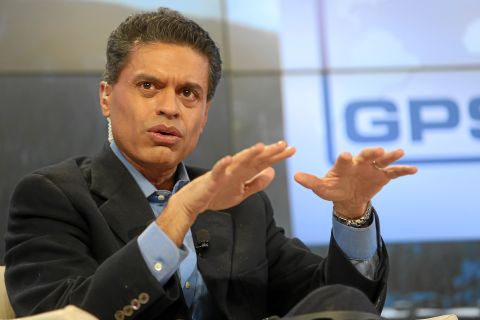Podcast: Play in new window | Download
Subscribe: RSS

Fareed Zakaria holds forth on CNN. He’s one of the better pundits, but as with them all, the reasoning tends to be circular and the fables disconnected from reality. (Wikipedia Photo)
Another Sunday, another tsunami of TV tirades from the elders of our tribe, as we gather around the firelike tube and absorb their wisdom. (Will someone please explain to me why William Kristol is there, week after week? How is it that a man who has been so wrong so often gets invited back to the inner circle, and how is it he is still smirking?) Hundreds of pundit-hours, in a single morning, yesterday most of it devoted to explaining to us the Middle East.
Among these explainers, perhaps the least doctrinaire and most intelligent is Fareed Zakaria, who with Time Magazine and CNN has created an admirable Pundit Empire. He is unusually well-informed and usually worth listening to, but on Sunday he was merely the least worst of the punditocracy, as he and they sought to set us all straight on what is going on Over There, in the Middle East.
It’s all about freedom, he said. Arab Spring, Syrian revolt, Iraqi turmoil, they are all a consequence of where people are on a freedom meter; if the meter falls too low, they revolt, and change governments. And if, as in Egypt, the new government does not protect their freedom, they revolt again. But given enough freedom, as in the United States, you couldn’t get a protest going with a cattle prod. That, Mr. Zakaria said, is what he’s learned in a decade of thinking about it, and is what we need to know about the middle east.
He spent some time on Egypt, helping us to understand that after the freedom-lovers dumped the army-backed government of Hosni Mubarak in 2011, and elected Mohammed Morsi, Morsi failed to increase freedom. So the Egyptians dumped him and turned the government back over to the army. Yes, the army, legendary for its iron fist and brutal prisons, is the new BFF of freedom lovers in Egypt. On this odd note, the story of the Triumph of the Egyptian Freedom Lovers stops, because it has to. To go on, or to include more detail, would be fatal to the presupposition.
It’s odd, for example, that Mr. Zakaria did not mention on Sunday what happened in Egypt on Thursday: the electric grid supplying half the country failed, bringing traffic, commerce, communication — the entire economy — to a shuddering halt for six hours. That problem fixed, the country reverted to normal, which is constant rolling blackouts because the country doesn’t have enough fuel to generate its electricity. You might not have heard that the lack of electricity was prominent among the complaints of the protesters who brought Mubarak down, and Morsi, and who before much longer wil bring down the army as well.
It’s not that they are freedom lovers, these people who tolerated Mubarak for 30 years, but rather they are privation haters. They love eating, in a country that used to produce plenty of cheap bread for its people but where, now, wheat is imported and expensive; they love the cheap petroleum their government always supplied when it was oil rich, but now, oil is imported and increasingly expensive; they love electricity, which they once took for granted, but which now is expensive and unreliable.
It is the failure of Mubarak, and Morsi, and the army to even begin to deal with these problems that has inflamed the Egyptian people and is leading to the failure of the Egyptian state. Similar failures to deal with the existential concerns of people beset by new threats from climate change and peak oil have brought down governments across North Africa and the Middle East, and will bring down more as the problems worsen.
It would be helpful, for a tribe gathered around the firelike tubes on a Sunday, seeking to understand their world a little better, if the Pundits stopped spinning happy little fables in support of happy little hypotheses about how the world works. We could use more information about what is happening (did anybody cover that power failure?) and why. No, really. Why?
I stopped watching such shows decades ago; thanks for the reminder why I did so. They’re empty calories for the mind.
I felt better this morning after I saw this: https://www.youtube.com/watch?v=acT_PSAZ7BQ
I also stopped watching the talking heads years ago when I realized that their crystal balls were no clearer or accurate than mine.. As Americans we are so hung up on the notion that everyone wants freedom that, as Mr. Lewis correctly points out, all other factors are lost or ignored. I would love to see him on one of the Sunday shows and turn the whole debate upside down when he explained that the reason people revolt is most often more fundamental, including safety and security, food and shelter, a way to make a living and the other basics that give us dignity and some sense of sanity and control over our lives. That said, of course, that is only my personal opinion. One thing that is stunning to me is that with all these guys spewing hot air is that none of them seems inclined or capable of looking at such a crisis with any understanding of root causes. After all, since the beginning man has always pursued the basics of food and shelter to ensure his survival. We seem to have learned very little from history, including the history of human behavior.